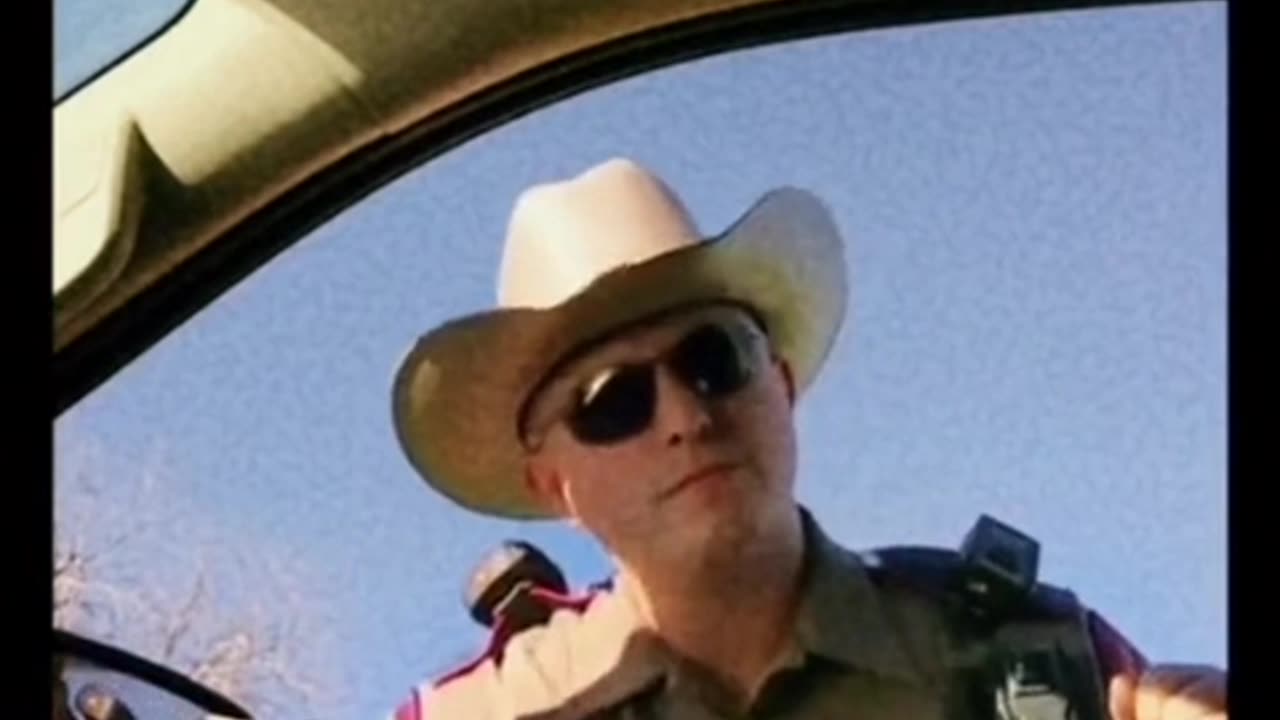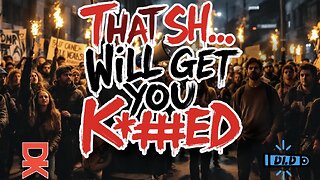Premium Only Content

The Right to Travel vs. Traffic Regulations: A Comprehensive Legal and Philosophical Analysis
The exchange between a driver and a patrol officer over the right to travel touches on a complex and often misunderstood area of law that intersects with fundamental constitutional rights, common law principles, and the state's regulatory powers. This article explores the legal foundation of the driver's argument, the historical evolution of traffic laws, and the philosophical implications of regulating the right to travel. By delving into key legal precedents, contrasting state and federal authority, and offering practical advice for those who wish to assert their rights, we aim to provide a well-rounded understanding of this contentious issue.
#### **I. Strengthening the Legal Foundation**
**A. In-Depth Case Law Analysis**
The driver in the exchange argues that his right to travel is being infringed upon by the officer's enforcement of traffic regulations, particularly those requiring a driver's license and insurance. This argument draws upon a legal tradition that distinguishes between the right to travel, as protected by the Constitution, and the regulation of commercial activities on public roads.
In *Hale v. Henkel* (1906), the Supreme Court emphasized the distinction between rights and privileges, stating that "the individual owes nothing to the public so long as he does not trespass upon their rights." This case is often cited to support the argument that individuals have an inherent right to travel without governmental interference, provided they are not engaged in commercial activities. Similarly, in *Thompson v. Smith* (1930), the Virginia Supreme Court recognized the right to travel as a fundamental right, not a mere privilege that could be arbitrarily revoked by the state.
However, subsequent rulings have placed limitations on these principles, particularly when it comes to the state's authority to regulate traffic for public safety. In *California v. Bostick* (1991) and *Delaware v. Prouse* (1979), the Supreme Court upheld the state's power to enforce traffic regulations, including stops to check licenses and registrations, as reasonable exercises of the state's police powers. These cases highlight the courts' efforts to balance individual rights with the need to ensure public safety on the roads.
**B. Contrasting State vs. Federal Authority**
The tension between state-level traffic regulations and federally protected rights, such as the right to travel, raises important questions about the limits of state power. The *Supremacy Clause* of the Constitution establishes that federal law takes precedence over state laws, particularly when state regulations infringe upon constitutionally protected rights.
However, the courts have generally upheld the states' authority to regulate traffic under their police powers, provided these regulations do not explicitly violate federal constitutional rights. The potential for a federal challenge to state traffic laws, based on the argument that they infringe upon the right to travel, remains an area of legal uncertainty. Such a challenge would require a careful examination of whether current traffic laws exceed the state's legitimate regulatory interests and whether they unduly burden the right to travel.
#### **II. Expanding Historical and Philosophical Context**
**A. Historical Evolution of Traffic Regulation**
Traffic regulations, as we know them today, have evolved significantly over the past century. In the early days of the automobile, roads were relatively unregulated, and the concept of requiring a license to operate a vehicle was novel. As motor vehicles became more common and roadways more congested, the need for regulation became apparent to prevent accidents and ensure public safety.
The introduction of driver's licenses, insurance requirements, and speed limits were justified as necessary measures to protect the public. However, these regulations also introduced a new layer of state control over individual behavior, raising questions about the extent to which the government could impose restrictions on a fundamental right like the right to travel.
**B. Philosophical Perspectives on Freedom and Regulation**
The philosophical underpinnings of the right to travel can be traced back to Enlightenment thinkers like John Locke, who emphasized natural rights, including the right to life, liberty, and property. Locke's ideas suggest that individuals have an inherent right to move freely, unimpeded by unnecessary government interference. This perspective aligns with the argument that the right to travel is a fundamental liberty that should not be restricted without compelling justification.
On the other hand, social contract theories, as articulated by philosophers like Thomas Hobbes and Jean-Jacques Rousseau, justify government regulation as a necessary trade-off for the benefits of living in an organized society. From this viewpoint, traffic regulations are seen as reasonable limitations on individual freedom, enacted to protect the collective good. This tension between individual rights and collective responsibilities is at the heart of the debate over the right to travel and traffic regulation.
#### **III. Integrating Practical Guidance and Implications**
**A. Practical Advice for Drivers**
For drivers who wish to assert their right to travel without a license, it is crucial to understand the legal risks and challenges they may face. While some legal precedents support the argument that personal travel in a private vehicle does not require state regulation, this position is not widely recognized by courts today. Drivers who refuse to provide a license or proof of insurance during a traffic stop may face fines, arrest, and legal battles that can be both time-consuming and costly.
It is essential for individuals in this position to be fully informed about the specific laws in their state and to consider the potential consequences of challenging these laws. Engaging with a knowledgeable attorney who specializes in constitutional or traffic law is advisable for those who wish to pursue this course of action.
**B. Potential Legal Strategies**
For those committed to challenging traffic regulations based on the right to travel, there are several legal strategies that may be pursued. These include filing lawsuits that argue state regulations are unconstitutional, seeking declaratory judgments, or requesting injunctions to prevent the enforcement of certain traffic laws. Building a strong case may require gathering evidence that demonstrates how these laws disproportionately affect non-commercial travelers and presenting well-reasoned constitutional arguments.
Moreover, individuals should consider the broader implications of their case. A successful legal challenge could set a precedent that affects traffic regulations nationwide, potentially reshaping the legal landscape regarding the right to travel.
#### **IV. Addressing Counterarguments and Critiques**
**A. Engaging with Opposing Views**
To provide a balanced analysis, it is important to engage with the counterarguments to the driver's position. Courts and legal scholars often reject the argument that traffic regulations infringe upon the right to travel, citing the state's responsibility to maintain public safety. Critics argue that without these regulations, roadways would become chaotic, leading to an increase in accidents and harm to the public.
The state’s interest in regulating who can operate a vehicle is often seen as a legitimate exercise of its police powers, particularly given the potential dangers posed by untrained or uninsured drivers. Engaging with these views helps to clarify the limitations of the right-to-travel argument and the challenges that individuals may face when asserting this right.
**B. Exploring Alternative Perspectives**
In addition to legal and philosophical perspectives, it is valuable to consider insights from civil liberties organizations, law enforcement, and legal scholars. These perspectives can provide a broader context for understanding the debate over the right to travel and the role of traffic regulations. For instance, some civil liberties advocates may support the right to travel but also recognize the need for reasonable regulation to ensure public safety.
#### **V. Proposing Reforms and Future Directions**
**A. Reevaluating Traffic Regulations**
As society evolves, it may be time to reevaluate traffic regulations to better align with constitutional rights. One potential reform is to distinguish more clearly between commercial and non-commercial use of vehicles, with more lenient licensing requirements for personal travel. This approach could respect the right to travel while maintaining necessary safety standards for those engaged in commercial activities.
Additionally, advances in technology, such as automated vehicles, could reduce the need for stringent regulations on human drivers, potentially leading to a relaxation of current laws. These developments offer an opportunity to rethink the balance between individual freedoms and public safety in the context of modern transportation.
**B. Broader Implications for Civil Liberties**
The debate over the right to travel has broader implications for civil liberties in the United States. If traffic regulations are successfully challenged on constitutional grounds, it could set a precedent for challenging other forms of government regulation that infringe upon individual rights. This could lead to a reevaluation of laws in areas such as health care, privacy, and free speech, where the balance between government control and personal freedom is continually being negotiated.
#### **Conclusion: Navigating the Complexities of the Right to Travel**
The exchange between the driver and the patrol officer highlights the ongoing tension between individual rights and state regulation. While the right to travel is a fundamental liberty, its application in the context of modern traffic laws is fraught with legal complexities. By exploring the historical, legal, and philosophical dimensions of this issue, we gain a deeper understanding of the challenges and opportunities involved in asserting the right to travel.
As this article has shown, the debate over traffic regulations and the right to travel is far from settled. It invites continued discussion and exploration, both in the courts and in the broader public discourse. Whether advocating for reform, challenging existing laws, or simply seeking to understand the principles at stake, individuals must navigate this complex legal landscape with care, awareness, and a commitment to both personal freedom and the collective good.
-
 24:29
24:29
FragmentsOfTruth
4 days agoModern Relationships Are Collapsing – But Who’s to Blame?
2982 -
 UPCOMING
UPCOMING
DLDAfterDark
25 minutes agoDLD Live! That Sh... Will Get You K***ed! What To Consider in SHTF
-
 LIVE
LIVE
megimu32
3 hours agoON THE SUBJECT: IRL Streamers Attacked & Nostalgic Animal Movies That Made Us Cry
433 watching -
 1:00:54
1:00:54
The Tom Renz Show
7 hours agoMore Epstein/FBI, a Scary Trade War, & the Dem Echo Chamber
7.49K1 -
 40:43
40:43
Kimberly Guilfoyle
8 hours agoDems Double Down on Delusion-Why? Live with Tony Kinnett & Bo French | Ep.202
77.8K35 -
 1:28:42
1:28:42
Redacted News
6 hours agoBREAKING! SOMETHING BIG IS HAPPENING IN EUROPE ALL OUT WAR IS COMING AGAINST RUSSIA, TRUMP FURIOUS
121K286 -
 47:50
47:50
Candace Show Podcast
6 hours agoBREAKING: Judge Makes Statement Regarding Taylor Swift's Text Messages. | Candace Ep 155
113K117 -
 1:14:23
1:14:23
Josh Pate's College Football Show
3 hours ago $0.29 earnedCFB’s Most Hated Teams | FSU & Clemson Future | Big Ten Win Totals | Star Rankings Overrated?
14.5K -
 1:33:47
1:33:47
CatfishedOnline
5 hours agoGoing Live With Robert - Weekly Recap
27.8K -
 55:18
55:18
LFA TV
1 day agoEurope’s Sudden Turn Against America | TRUMPET DAILY 3.6.25 7PM
32.2K3